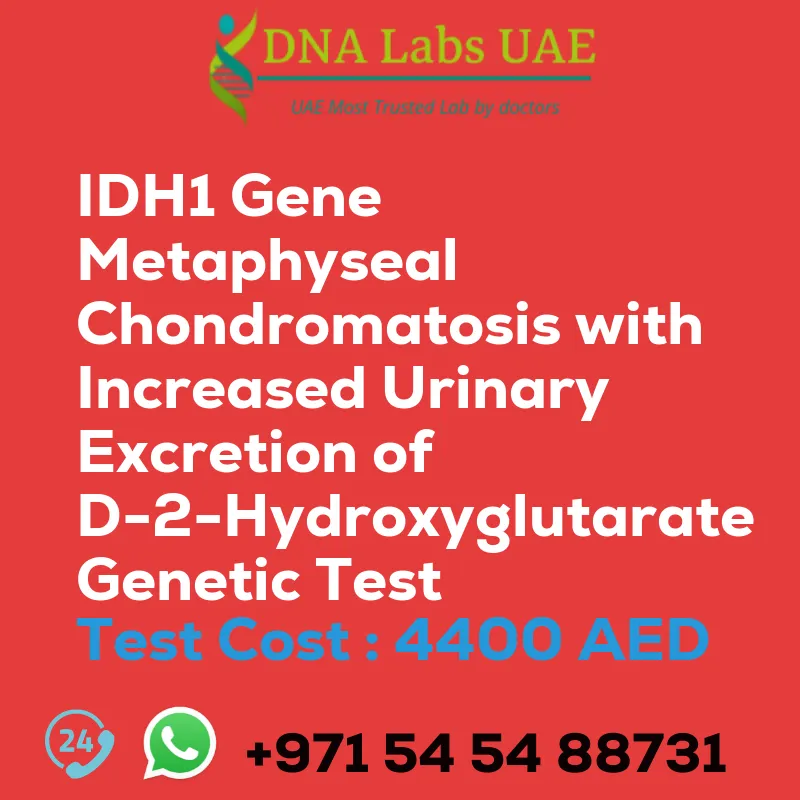IDH1 Gene Metaphyseal Chondromatosis Genetic Test
Welcome to DNA Labs UAE, a leading genetic lab offering the IDH1 Gene Metaphyseal Chondromatosis Genetic Test. This test is designed to diagnose and manage the rare genetic disorder known as metaphyseal chondromatosis with increased urinary excretion of D-2-hydroxyglutarate (MC-HGA).
Test Details
The IDH1 gene is responsible for encoding the enzyme isocitrate dehydrogenase 1, which plays a crucial role in the metabolism of isocitrate to alpha-ketoglutarate in the citric acid cycle. Mutations in the IDH1 gene have been linked to various diseases, including MC-HGA.
MC-HGA is characterized by abnormal cartilage development in the long bones, resulting in short stature and skeletal abnormalities. Individuals with MC-HGA also have an increased excretion of D-2-hydroxyglutarate (D-2-HG) in their urine. D-2-HG is an abnormal metabolite that accumulates due to the dysfunction of the IDH1 enzyme.
Our IDH1 Gene Metaphyseal Chondromatosis Genetic Test utilizes NGS (Next-Generation Sequencing) technology, allowing for the simultaneous analysis of multiple genes for mutations or variations. This comprehensive approach enables accurate identification of mutations in the IDH1 gene associated with MC-HGA.
Test Components and Pricing
Test Name: IDH1 Gene Metaphyseal Chondromatosis with Increased Urinary Excretion of D-2-hydroxyglutarate Genetic Test
- Price: 4400.0 AED
- Sample Condition: Blood or Extracted DNA or One drop Blood on FTA Card
- Report Delivery: 3 to 4 Weeks
- Method: NGS Technology
- Test Type: Osteology Dermatology Immunology Disorders
Referring Doctor and Test Department
Referring Doctor: Dermatologist
Test Department: Genetics
Pre Test Information
Prior to undergoing the IDH1 Gene Metaphyseal Chondromatosis Genetic Test, it is important to provide the clinical history of the patient. Additionally, a genetic counseling session may be conducted to draw a pedigree chart of family members affected by MC-HGA. This information helps in the interpretation of test results and provides valuable guidance.
Please note that genetic testing should always be performed by a qualified healthcare professional or genetic counselor who can accurately interpret the results and provide appropriate counseling and guidance.
| Test Name | IDH1 Gene Metaphyseal chondromatosis with increased urinary excretion of D-2-hydroxyglutarate Genetic Test |
|---|---|
| Components | |
| Price | 4400.0 AED |
| Sample Condition | Blood or Extracted DNA or One drop Blood on FTA Card |
| Report Delivery | 3 to 4 Weeks |
| Method | NGS Technology |
| Test type | Osteology Dermatology Immunology Disorders |
| Doctor | Dermatologist |
| Test Department: | Genetics |
| Pre Test Information | Clinical History of Patient who is going for IDH1 Gene Metaphyseal chondromatosis with increased urinary excretion of D-2-hydroxyglutarate NGS Genetic DNA Test. A Genetic Counselling session to draw a pedigree chart of family members affected with IDH1 Gene Metaphyseal chondromatosis with increased urinary excretion of D-2-hydroxyglutarate NGS Genetic DNA Test gene IDH1 |
| Test Details |
The IDH1 gene is a gene that encodes for the enzyme isocitrate dehydrogenase 1, which is involved in the metabolism of isocitrate to alpha-ketoglutarate in the citric acid cycle. Mutations in the IDH1 gene have been associated with various diseases, including metaphyseal chondromatosis with increased urinary excretion of D-2-hydroxyglutarate (MC-HGA). MC-HGA is a rare genetic disorder characterized by abnormal cartilage development in the long bones, resulting in short stature and skeletal abnormalities. Additionally, individuals with MC-HGA have an increased excretion of D-2-hydroxyglutarate (D-2-HG) in their urine. D-2-HG is an abnormal metabolite that accumulates due to the dysfunction of the IDH1 enzyme. NGS (Next-Generation Sequencing) genetic testing is a method used to analyze multiple genes simultaneously for mutations or variations. In the case of MC-HGA, NGS genetic testing can be used to identify mutations in the IDH1 gene that are responsible for the disease. This type of testing allows for a more comprehensive analysis of the genetic information and can help in the diagnosis and management of MC-HGA. It is important to note that genetic testing should be performed by a qualified healthcare professional or genetic counselor who can interpret the results and provide appropriate counseling and guidance. |








